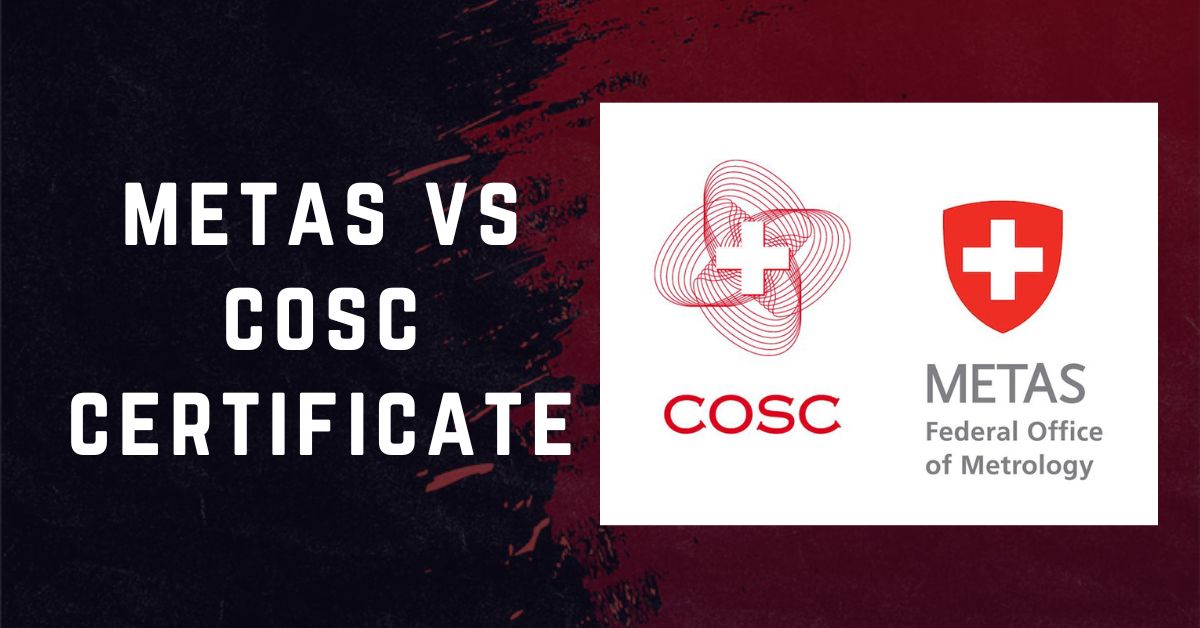In the realm of luxury timepieces, precision reigns supreme. Ensuring a watch tells time with exceptional accuracy is paramount for both watchmakers and discerning watch enthusiasts. Two prominent players in the world of watch certification are the Swiss institutes METAS (Metropolitan Examination Technical Association of Swatch Group) and COSC (Contôle Officiel Suisse des Chronomètres).
Both organizations certify the chronometric performance of mechanical watches, but they differ in their testing procedures and stringency. Understanding these distinctions empowers you to make informed decisions when selecting a timepiece with exceptional accuracy.
The Custodian of Tradition: Exploring the Legacy of COSC
Established in 1973, the COSC is a non-profit organization recognized by the Swiss government. For decades, it has served as the benchmark for chronometer certification and is renowned for its rigorous testing procedures.
To earn the coveted COSC designation, a watch movement must undergo a series of stringent tests conducted over a 15-day period in five different positions (dial up, dial down, crown up, crown left, crown right). These tests evaluate the movement’s accuracy in various temperatures (ranging from 3°C to 38°C) and six different positions.
Here’s a table summarizing the key aspects of COSC certification:
| Feature | Description |
|---|---|
| Established | 1973 |
| Organization Type | Non-profit, Swiss government recognized |
| Testing Duration | 15 days |
| Tested Positions | 5 (dial up, down, crown up, left, right) |
| Temperature Range | 3°C to 38°C |
The Rise of a New Standard: Unveiling the METAS Certification
Founded in 2007 by the Swatch Group, METAS emerged as a response to the evolving needs of the watch industry. While acknowledging the importance of COSC standards, METAS sought to establish even more rigorous testing procedures that encompass a wider range of factors impacting watch performance.
METAS certification goes beyond just chronometric accuracy, evaluating the movement’s resistance to magnetic fields, water resistance, power reserve accuracy, and overall functionality.
Here’s a table summarizing the key aspects of METAS certification:
| Feature | Description |
|---|---|
| Established | 2007 |
| Organization Type | Private, established by the Swatch Group |
| Testing Duration | Varies depending on the test (typically longer than COSC) |
| Tested Positions | 6 (same as COSC, plus additional specific orientations) |
| Temperature Range | More extensive range than COSC (typically -6°C to +48°C) |
| Additional Tests | Magnetic resistance, water resistance, power reserve accuracy, functionality |
A Tale of Two Standards: Exploring the Key Differences
While both COSC and METAS certifications guarantee a high level of watch performance, they differ in several key aspects:
Scope of Testing: METAS certification offers a more comprehensive evaluation, encompassing not only chronometric accuracy but also magnetic resistance, water resistance, power reserve, and overall functionality. COSC primarily focuses on chronometric precision.
Stringency of Testing: METAS tests are generally more rigorous, subjecting watches to a wider range of temperatures, stronger magnetic fields, and more demanding positions.
Transparency: METAS publishes detailed test results online for each certified watch, allowing for greater transparency. COSC results remain confidential between the institute and the watch manufacturer.
Here’s a table summarizing the key differences between COSC and METAS certification:
| Feature | COSC | METAS |
|---|---|---|
| Scope of Testing | Chronometric accuracy | Chronometric accuracy, magnetic resistance, water resistance, power reserve, functionality |
| Stringency of Testing | Less stringent | More stringent |
| Transparency | Confidential results | Publicly available test results |
Choosing the Right Champion: Selecting the Ideal Certification
The decision between a COSC-certified or METAS-certified watch is a nuanced one, hinging on your specific needs and priorities. Let’s delve deeper into the factors that can guide your choice:
Prioritizing Precision
Exceptional Accuracy Under Diverse Conditions: If unwavering timekeeping under a variety of circumstances is paramount, a METAS-certified watch excels. While COSC ensures excellent accuracy, METAS pushes the boundaries with its broader temperature range and additional position testing.
Magnetic Resistance Matters
Frequent Exposure to Strong Magnetic Fields: For individuals who regularly encounter strong magnetic fields (airports, medical equipment), a METAS-certified watch provides superior anti-magnetism, safeguarding the watch’s precision.
Budget Considerations
Balancing Price and Performance: METAS certification often translates to a higher price tag compared to COSC counterparts. Consider your budget and whether the additional cost aligns with your needs.
Brand Preferences and Certification Practices
Brand Loyalty with Limited Certification Options: Not all watchmakers participate in METAS certification. If you have your heart set on a specific brand, research their certification practices to determine if they align with your desire for COSC or METAS certification.
Real-World Needs
Everyday Wear vs. Demanding Conditions: For everyday wear without constant exposure to extreme environments, a COSC-certified watch might be more than sufficient. METAS offers the ultimate level of performance, ideal for professionals like pilots or those demanding exceptional resilience in their timepieces.
Remember: Certifications are just one piece of the puzzle. Here are some additional factors to consider for a well-rounded decision:
Movement Type: High-end mechanical movements, even without certification, can boast superior accuracy. Research the specific movement caliber of the watch you’re considering.
Brand Reputation: Established watchmakers with a long history of meticulous craftsmanship and dedication to precision often command a premium, but this reputation reflects a commitment to consistent quality.
Materials and Construction: High-quality materials like sapphire crystal and robust case construction contribute to a watch’s longevity and overall performance.
The Final Word: Beyond Benchmarks
While COSC and METAS certifications are valuable indicators of performance, a truly exceptional watch is a culmination of several factors. Consider these alongside the certification details to make an informed decision:
By understanding your priorities, researching the watch’s technical specifications, and appreciating the broader context of brand reputation and construction quality, you can confidently select a timepiece that aligns perfectly with your needs and desires. Happy hunting!
A Matter of Prestige: The Value of Certification
Both COSC and METAS certifications add a layer of prestige and value to a watch. They signify that the movement has undergone rigorous testing and upholds high standards of performance. For discerning watch enthusiasts, these certifications represent a commitment to quality and a guarantee of exceptional timekeeping.
Beyond the Benchmarks: Exploring Additional Considerations
While COSC and METAS certifications are valuable indicators of performance, other factors contribute to a watch’s overall quality:
- Movement Type: High-end mechanical movements often boast superior accuracy even without certification. Research the specific movement caliber of the watch.
- Brand Reputation: Established watchmakers are renowned for their meticulous craftsmanship and dedication to precision.
- Materials and Construction: High-quality materials and meticulous construction contribute to a watch’s longevity and performance.
FAQs
Is a METAS-certified watch more accurate than a COSC-certified watch?
METAS certification offers a more comprehensive evaluation, potentially leading to slightly better accuracy under extreme conditions. However, both COSC and METAS ensure excellent timekeeping for everyday wear.
Do all luxury watches have COSC or METAS certification?
No, not all luxury watches possess either certification. Some brands adhere to their own rigorous testing standards, while others may prioritize aesthetics or functionality over certified accuracy.
Is a COSC-certified watch worth the extra cost?
COSC certification guarantees a high level of chronometric performance. Whether the additional cost is worthwhile depends on your individual priorities. For some, the prestige and assurance of certified accuracy justify the premium.
Can a watch have both COSC and METAS certifications?
Yes, some watches, particularly those manufactured by brands within the Swatch Group, achieve both COSC and METAS certifications. This signifies exceptional performance across all tested metrics.
Where can I find information about a watch’s certification?
The watch manufacturer’s website or authorized dealer should clearly state whether the watch has COSC or METAS certification. You can also find this information engraved on the watch’s case back or dial.
By delving into these FAQs, you’ve gained valuable insights to navigate the world of watch certifications with confidence. Whether you prioritize the established legacy of COSC or the comprehensive testing of METAS, understanding these distinctions empowers you to make informed decisions when selecting your next luxury timepiece.
Remember, the ideal certification hinges on your specific needs and desires for accuracy, functionality, and prestige. So, embark on your watch collecting journey with a clear understanding of these renowned certifications and discover the perfect timepiece to grace your wrist.

